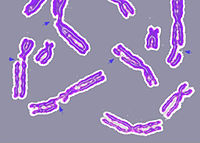
Photo from wikipedia
The genomics revolution continues to change how ecologists and evolutionary biologists study the evolution and maintenance of biodiversity. It is now easier than ever to generate large molecular data sets… Click to show full abstract
The genomics revolution continues to change how ecologists and evolutionary biologists study the evolution and maintenance of biodiversity. It is now easier than ever to generate large molecular data sets consisting of hundreds to thousands of independently evolving nuclear loci to estimate a suite of evolutionary and demographic parameters. However, any inferences will be incomplete or inaccurate if incorrect taxonomic identities and perpetuated throughout the analytical pipeline. Due to decades of research and comprehensive online databases, sequencing and analysis of mitochondrial DNA (mtDNA), chloroplast DNA (cpDNA) and select nuclear genes can provide researchers with a cost effective and simple means to verify the species identity of samples prior to subsequent phylogeographic and population genomic analysis. The addition of these sequences to genomic studies can also shed light on other important evolutionary questions such as explanations for gene tree‐species tree discordance, species limits, sex‐biased dispersal patterns, adaptation, and mtDNA introgression. Although the mtDNA and cpDNA genomes often should not be used exclusively to make historical inferences given their well‐known limitations, the addition of these data to modern genomic studies adds little cost and effort while simultaneously providing a wealth of useful data that can have significant implications for both basic and applied research.
Journal Title: Molecular Ecology
Year Published: 2023
Link to full text (if available)
Share on Social Media: Sign Up to like & get
recommendations!